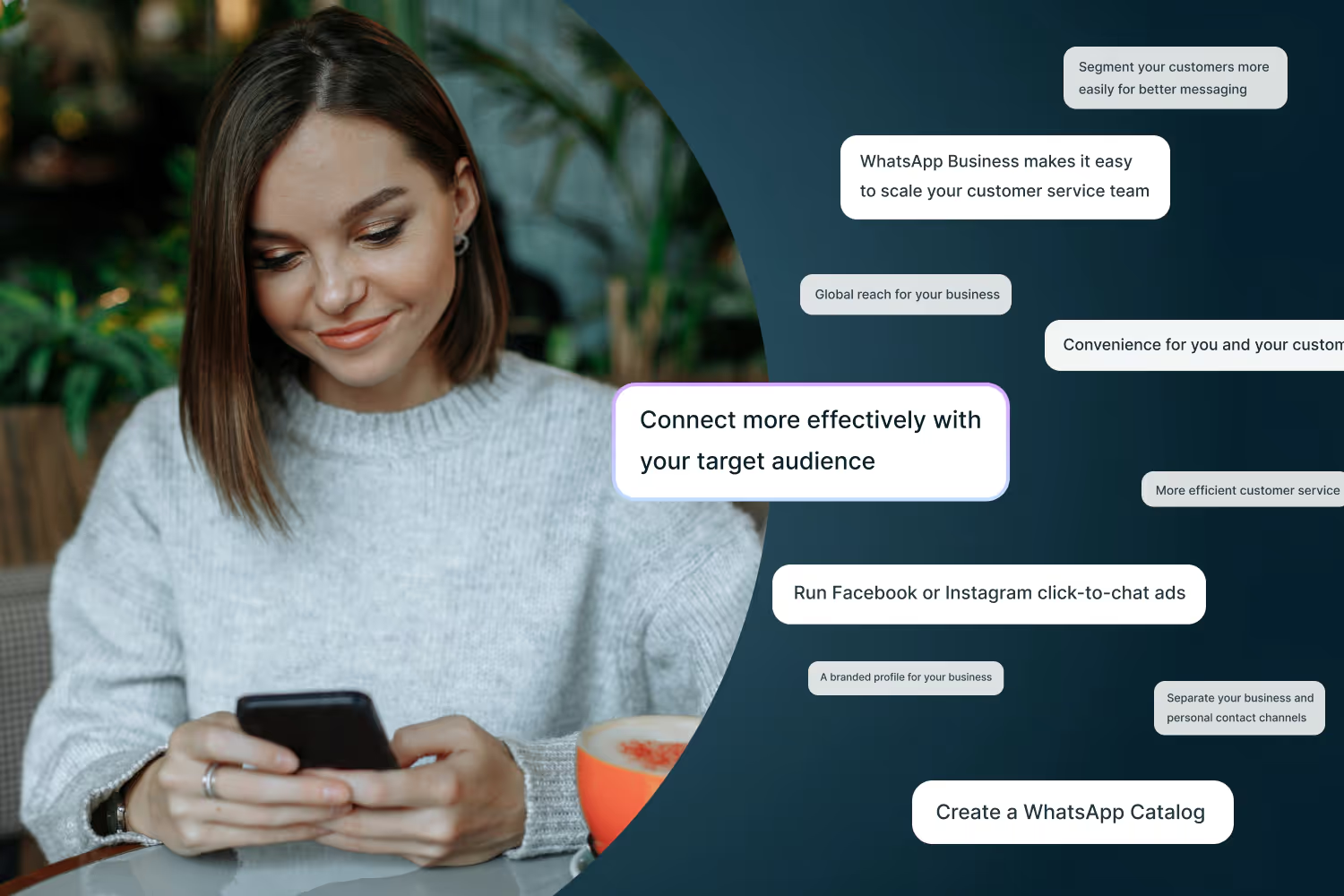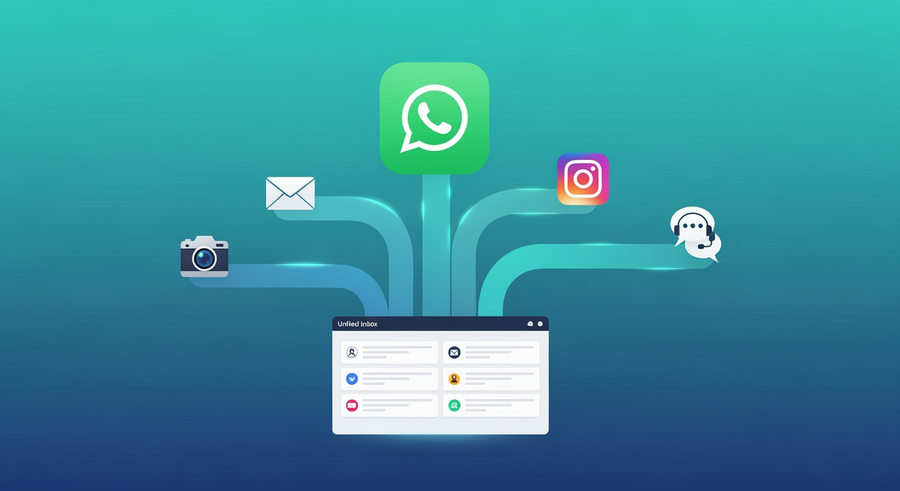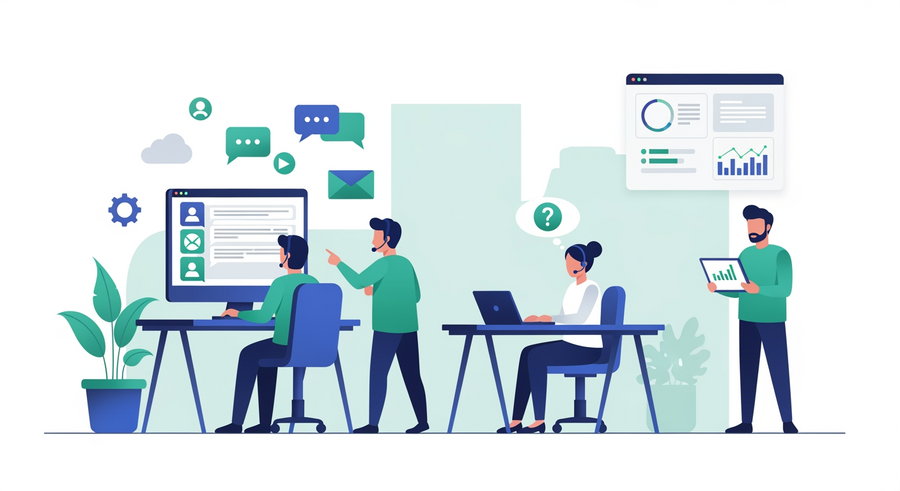2.26 billion.
That’s the number of people that use WhatsApp globally. To put it into perspective, 1 in 4 people use this popular messaging app today.
In the past 13 years, it has successfully driven out competitors like Skype and has become the primary channel of communication for people all over the world.
Ever since its inception, WhatsApp's app design (and therefore its intended use) has evolved.
In 2009, WhatsApp could only be used to send and receive texts; with time, users could voice call, video call, send and receive gifs and emojis, and form groups. Today, WhatsApp continues evolving and has penetrated a new niche: marketplaces.
This article will share the most significant benefits businesses can gain from using WhatsApp Business.
Excited? Let’s dive in.
What is WhatsApp Business?
WhatsApp Business is a free global messaging and customer support app available for both Android and iOS. It helps streamline customer communication and business workflow, while adding a personal touch to it as well.
While WhatsApp business was created specifically for small businesses, to cater to bigger enterprises, WhatsApp eventually introduced the WhatsApp Business API.
The WhatsApp Business API allows large businesses to deal with high-volume messages and can be accessed across multiple devices, making working with a team easier.
Top 9 benefits of using WhatsApp Business
You’ve heard of WhatsApp business.
But you’re not sure if your business is ready for it.
Introducing a new customer support channel can be a time-consuming process. So you’re probably wondering, ‘Is it even worth my time (and energy) to invest in a new customer support tool?’
Absolutely.
Here’s why.
1. Meet your customers where they already are
Over 2 billion WhatsApp users mean the probability of a massive chunk of your customer base already using this platform is pretty high.
Would you believe over 1.1 million messages are being sent every second on WhatsApp? And studies show more than 175 million people message a WhatsApp business account every single day.
Instead of introducing a new communication channel and spending time and effort to migrate customers to that platform, it is convenient to use an already established and extremely popular messaging channel.
2. Offer better customer support
Have you ever put off reading emails or responding to them?
Well, me too.
It’s far easier to send a quick text message over WhatsApp and wrap up the conversation in a few minutes that would have otherwise taken hours, or even days, had it been over email.
Long-drawn phone calls can also be a huge time waste, for customer support teams and customers, both.
Studies also show that 90% of people respond within 30 minutes on instant messaging apps while email responses are only 17%.
Enter WhatsApp.
This instant messaging app has an ease of use that traditional communication channels, like emails and phone calls, lack.
Quicker responses mean happier customers.
Happier customers = more sales + higher customer retention rate
WhatsApp business also offers a very cool option to add the WhatsApp Chat Button on your website. With this button, you can keep the conversation with your customers long after they leave the website.

Likewise, it makes things easier for your customers since they won’t have to pull up the website whenever they need a query answered. They can simply contact you using their primary communication channel, WhatsApp.
📚 Read more: How to use WhatsApp for customer service
3. Form a personal connection with customers
People use WhatsApp to stay in touch with their loved ones. It’s an informal form of instant messaging that screams personal communication.
If you choose to use WhatsApp Business to connect with your customers, you will also be categorised in the same league by them.
The personal connections you form through WhatsApp will help you create a higher customer lifetime value.
Studies show that 70% of emotionally engaged customers spend up to two or more times on the brand they are loyal to. WhatsApp Business helps put a voice and face behind customer support: making it more human.
An excellent example of building personalised connections via WhatsApp is The Polar Company.
Using the WhatsApp Business API revolutionised The Polar Company’s customer service, and they could cater to the customer base much more efficiently.
They receive over 300 tickets a day, and manually sorting out these requests was consuming a huge chunk of their time.
Using the WhatsApp Business API allowed them to handle 100 tickets per hour, which allowed The Polar Company to “be more personal with our customers than our competitors”, as Martijn Bohnke, Co-founder of The Polar Company, says.
Additionally, using Trengo, multiple native speakers from the Polar Company could reach out to customers in different countries - using the same number - and could successfully provide a better, more personalised experience.
4. Leverage the first mover’s advantage
You’re scrolling on Facebook or Instagram, and you come across a sponsored post.
What do you do?
Scroll right past it.
Social media platforms have become saturated with marketing campaigns and paid advertisements. While important, marketing on these social platforms is not easy - it takes a lot of effort and money to get noticed by your audience and prompt a response from them.
But WhatsApp is a comparatively newer platform. It has yet to be adopted by all businesses.
This is where you can jump in. Expanding your business to WhatsApp can give you a first-mover advantage and an edge over your competitors.
5. Use WhatsApp to boost your marketing
While primarily used for customer support, WhatsApp serves as a powerful marketing tool as well.
One of its main marketing features (that also gives it an edge over other marketing channels) is its Broadcast Messaging feature.

The broadcast messages feature allows businesses to send messages to multiple chats simultaneously. You can update customers about ongoing discounts and offers, notify them when particular articles are back in stock, and provide any other relevant news.
The best part?
While you’re broadcasting a WhatsApp message to a whole host of recipients (in the form of a group), the recipient doesn’t know this. They’ll receive the message as a single, private message - further helping you create a personalised experience for consumers.
Other important marketing and branding features include,
- WhatsApp Business profiles, which allow you to post a comprehensive description of your business along with a CTA to drive conversions.
- WhatsApp Business’s Catalog - an excellent way of displaying your products along with their price, description, website link, and product code.
6. Get deep insights into customer behaviour and happiness
Want to know how your business is performing?
Ask your customers.
This is where customer feedback and a deep dive into customer data analytics come into play.
While WhatsApp does not have an analytics tool yet, if you’re a WhatsApp Business API user, you can still get insights into your customer’s behaviour and happiness.
WhatsApp Business API does not come with its own interface so you'll need a customer engagement platform like Trengo to monitor your metrics.
Simply select the metrics that you’d like to track, such as response time, labels, user reports, and customer satisfaction, and voila - you’ll have the report ready almost instantly to analyse.
📚 Read more: WhatsApp Business analytics: how to get insights from customer interactions
7. Get discovered via the WhatsApp yellow pages
WhatsApp has developed and tested a business directory called the WhatsApp Yellow Pages. If you're using WhatsApp Business, you can register with the app’s business directory.
Customers in close proximity to you can visit your WhatsApp Business profile, read your business details mentioned there, and interact with you.
WhatsApp users can also simply search for businesses that provide services or products they’re looking for. This is where your first mover's advantage helps you massively too!
Chances are you can beat your competitors simply by getting your business registered on this business directory.
8. Automate answering messages
How many ‘What products do you offer?’ messages does it take to break you?
Manually replying to queries can be tiresome, which is why social media giants like Facebook and Instagram introduced automated messages to answer frequently asked queries.
Similarly, WhatsApp also allows businesses to set up quick responses to frequently asked questions using automated answering messages.
Take an automated welcome message - it goes a long way in making the customer feel welcome.
From discounts to delivery details, you can set up a Quick Replies message for all situations.
Another excellent way of automating your customer service is by leveraging WhatsApp’s chatbot. It simulates a conversation with the consumer just as a human customer representative would.
The digital world is fast embracing chatbots. Studies show that 67% of worldwide consumers interacted with a chatbot to get customer support over the past 12 months. And introducing a chatbot can help your business save up to 30% of your customer support costs!
❗Note that you need the WhatsApp Business API to deploy a chatbot.
9. Showcase your products via a product catalogue
You’ve added your business to WhatsApp’s Yellow Pages. You have people flocking over to your WhatsApp Business Profile. They’re curious about your product/service offering. How do you convert them?
Through a well-planned, aesthetically pleasing, and detail-oriented product catalogue.

Through your product catalogue, current (and potential) customers can have quick access to your offerings and see the products’ pictures and prices.
They might have bought a product from you a month ago, were satisfied with their purchase, and now would like to order more. Opening up your website and going through your products there is quite cumbersome. It’s far easier to simply click on your WhatsApp Chat, visit your product catalogue, and buy instantly.
Every product in the WhatsApp catalogue has a unique name, and you can also add a description, link to the website, and product codes. The WhatsApp catalogue can show up to 500 items.
Interested customers can eventually add products they’re interested into their carts and shop right from WhatsApp.
Conclusion
Nowadays, consumers want to connect with businesses in the same place and way that they connect with their personal connections.
To meet your customers where they are, the best solution is to start using the WhatsApp Business API. The API enables your team to answer messages, automate workflows and responses, and monitor performance and customer happiness.
Want to get started? Use Trengo to set up your WhatsApp Business API and take advantage of all these features right away!




.png)











